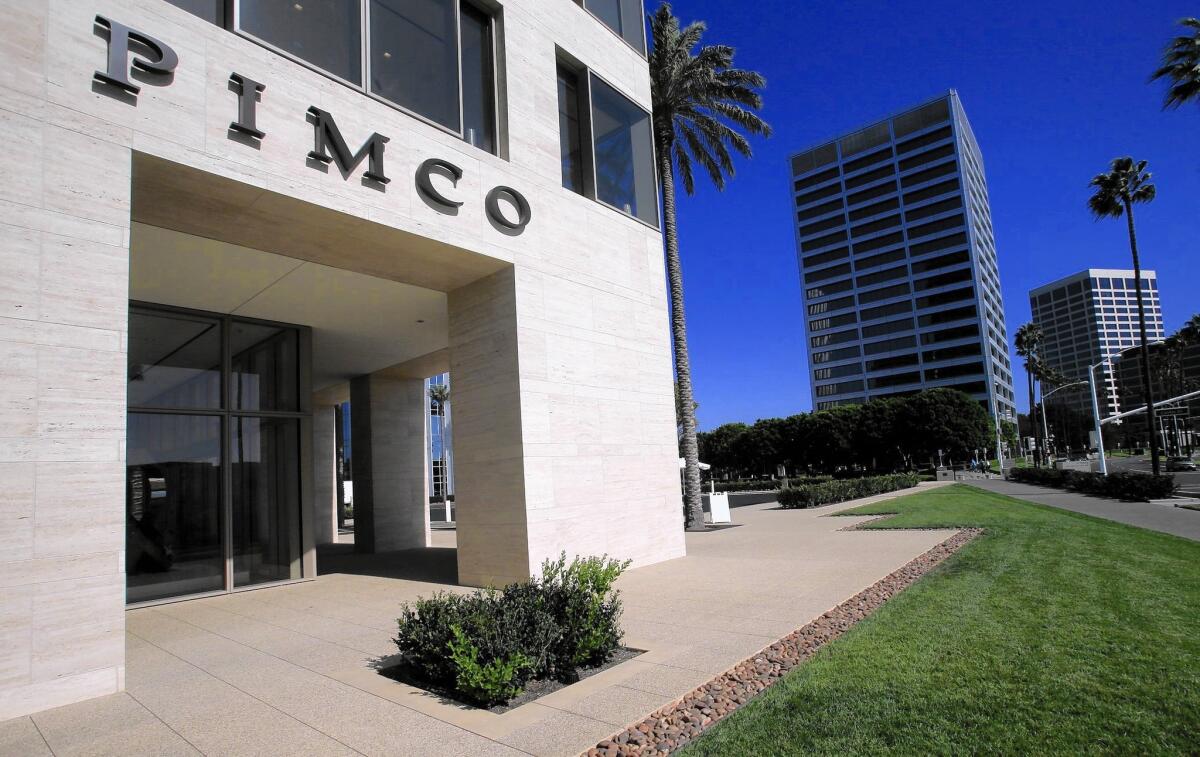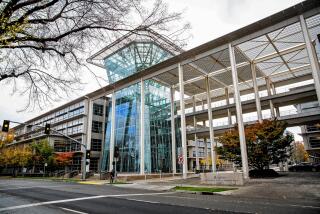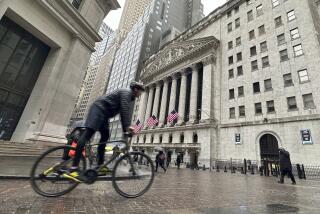Pimco bond fund suffers more outflows in October after Gross’ exit

Investors pulled $27.5 billion more from Pimco’s flagship Total Return Fund in October, its largest monthly drop, as the bond behemoth moved to shore up investor confidence and navigate an uncertain moment in the bond market.
Pacific Investment Management Co. said the outflows from Total Return were concentrated in the beginning of the month, shortly after the surprising Sept. 26 exit of its co-founder and former star manager, Bill Gross.
The Newport Beach company’s report suggests that the bellwether fund had seen the worst of the damage after several years of subpar results and a difficult 2014 marked by acrid management dissension that spilled into public view.
Still, the damage has been severe: October’s figures marked the 17th straight month of outflows that have drained the fund, leaving it at $170.9 billion at the end of the month from its peak of $298 billion in April 2013.
Christopher Schwarz, an associate finance professor at UC Irvine’s Paul Merage School of Business, said Pimco’s Total Return has endured defections from investors loyal to Gross as well as those who revisited the fund’s poor performance in the wake of the controversy that surrounded him for the better part of a year.
“They looked and saw the Total Return Fund hasn’t been doing that well, and decided, ‘OK, Bill Gross is gone, now let’s go find another [fund],’” he said.
Through it all, however, Pimco’s Total Return has remained the world’s largest mutual bond fund.
The investment giant, with a total of nearly $2 trillion in assets under management, has struggled mightily to steady the ship since Gross’ public jump to rival Janus Capital Management in September.
It rapidly installed new management, announced a flurry of high-profile new hires and reached out privately to reassure investors.
In advance of releasing its fund-flow figures Tuesday, the company said it had rehired Marc Seidner to a new position of chief investment officer of nontraditional strategies and head portfolio management for the New York office.
Seidner had served as a Pimco senior portfolio manager from 2009 until last January when he left abruptly at about the same time that the company’s chief executive, Mohamed El-Erian, stunned the financial world with his own departure. Reports surfaced of clashes El-Erian had with Gross.
El-Erian’s departure was followed by a number of management defections that Pimco has worked to reverse in the wake of Gross’ departure. Just last week, Pimco rehired two other executives who had left early this year. The company’s giant investment operation has been placed under Daniel Ivacyn, who had run a smaller Pimco fund.
Pimco’s problems come at a tricky time in its main market, bonds. For the last several years, the market for fixed-income securities of all types has been buoyant, driven by the Federal Reserve’s economic stimulus package that included bond purchases to help lower long-term interest rates.
With that key Fed program now ended, Pimco’s new management team faces a difficult environment in which investors will be forced to take defensive positions to mitigate the effects of falling bond prices, which can drag down returns.
“Investors who have long appreciated the total return of a bond mutual fund, that kind of performance is going to be much harder to duplicate moving forward,” said Todd Rosenbluth, director of mutual fund research for S&P Capital IQ. “We’re just not going to see the same kind of bond returns.”
Indeed, the turmoil around Gross has been doubly costly for Pimco’s Total Return Fund, which both lagged in performance during a strong market and suffered outflows while smaller rivals were gaining.
MetWest Total Return Bond Fund, run by Metropolitan West Asset Management in Los Angeles, saw assets grow more than 57% to $40.5 billion from $25.7 billion over the last 12 months. Nearly $7 billion of the increase occurred last month, according to investment research firm Morningstar Inc.
The MetWest fund, started in 1996 by Pimco alumni Tad Rivelle, Stephen Kane and Laird Landmann, attributed its recent success in part to team play by the leaders, in contrast to what had been a star-driven style at Pimco during Gross’ more than 40-year tenure.
“We believe the strong flows into our fixed-income funds are a result of our team approach, heritage of that team and outstanding performance,” said MetWest, now part of Los Angeles investment powerhouse TCW Group Inc.
Assets also flowed into the 13 mutual funds at DoubleLine Capital in Los Angeles, the 5-year-old investment firm started by another bond-trading star, Jeffrey Gundlach. DoubleLine said assets at the funds rose nearly $2.4 billion in October, bringing the total to $48 billion, with the DoubleLine Total Return Bond Fund gaining more than $1.8 billion.
It was the biggest net gain of any month this year and the third best month ever for DoubleLine since it launched the funds in 2010, said Ron Redell, the funds’ president.
At giant asset manager BlackRock Inc., investments in its Total Return Fund had bumped along at just under $3 billion for a year before jumping to just more than $4 billion in October, according to Morningstar’s calculations.
Meanwhile, money has been flowing steadily into the bond mutual fund market since the 2008 financial crisis, with the exception of 2013 when interest rates rose temporarily. Overall, the bond mutual fund market is $3.4 trillion, according to the Investment Company Institute.
Where bonds go from here remains an open question.
Brian Reid, the investment group’s chief economist, said analysts had been wrongly predicting a “great rotation” out of bonds for years. He argues that the market should receive support from demographic shifts, principally baby boomers heading into retirement who will prefer fixed income.
But UC Irvine’s Schwarz said the question for the near and intermediate term hinges on whether the Federal Reserve is correct that the economic recovery has gained momentum, laying the groundwork for rising interest rates.
“If the Fed is right, then bond prices should go down and bond funds should have negative returns,” he said. “The decision people are making about the [Pimco] Total Return Fund is about the Total Return Fund. But the decision people are trying to make in general is whether the Fed is right.”
Starkman reported from New York, Reckard from Los Angeles.








